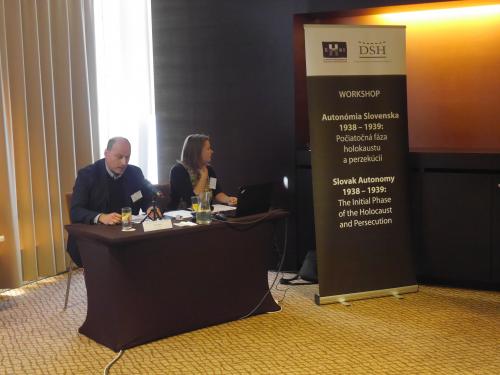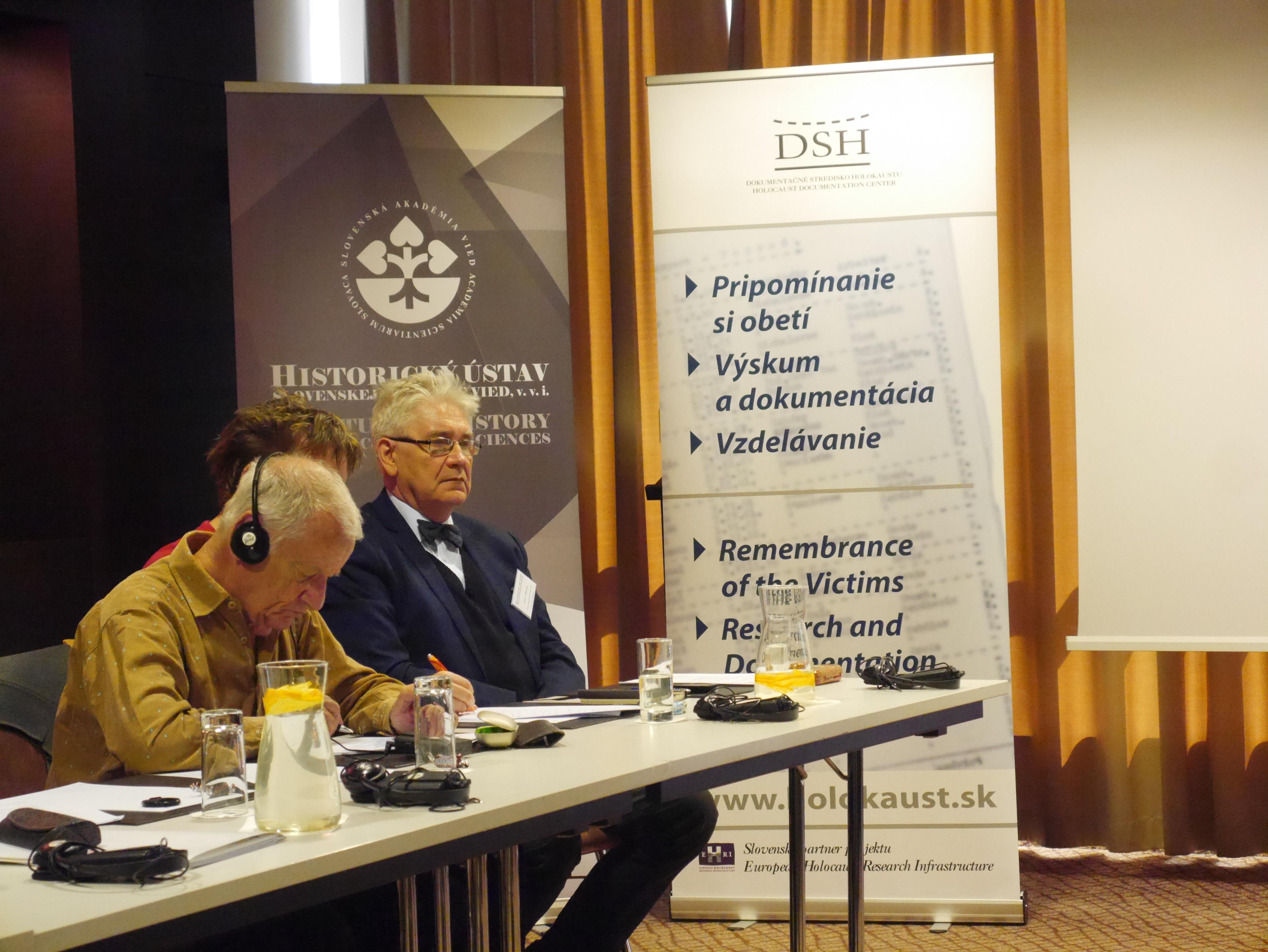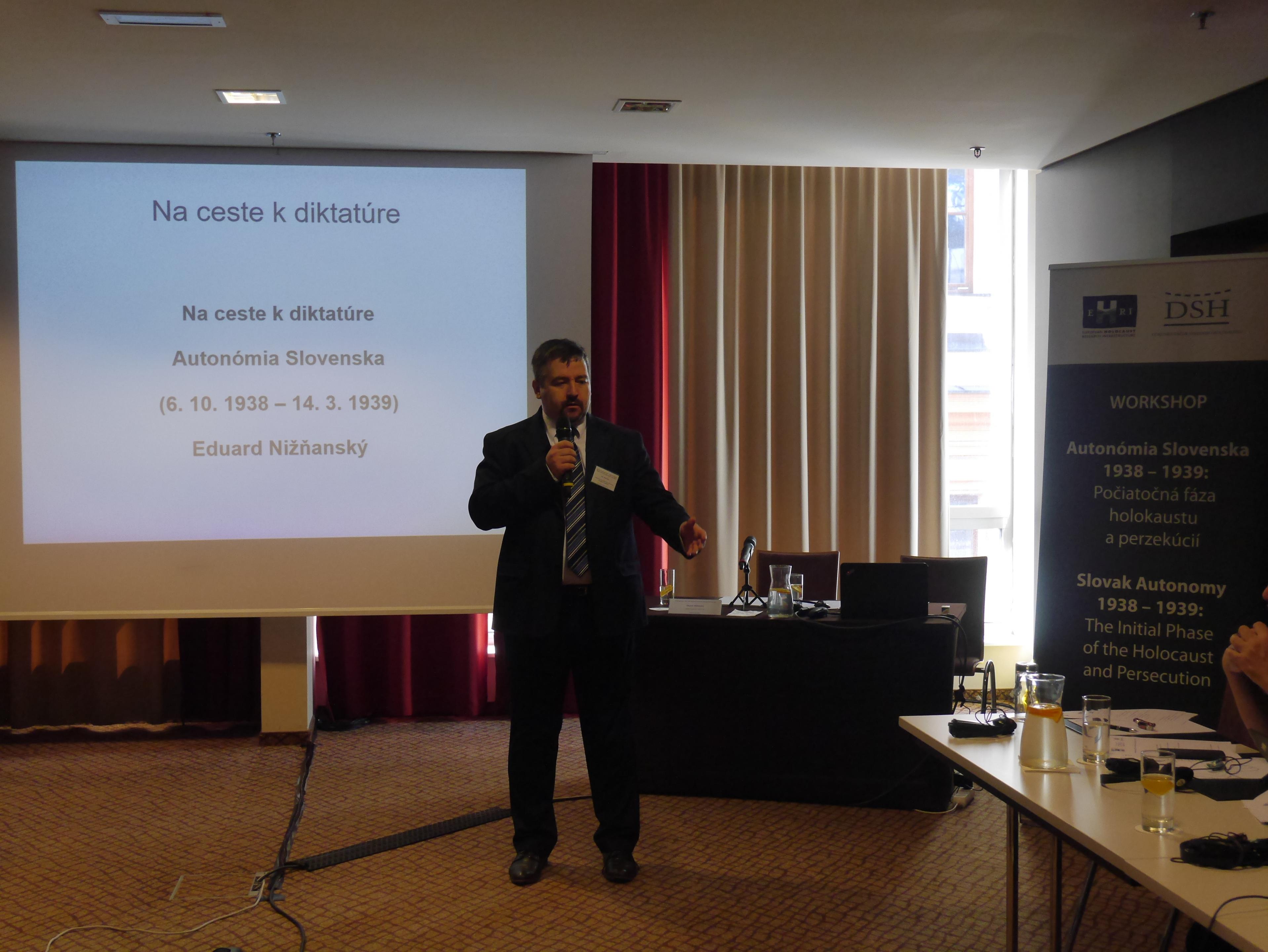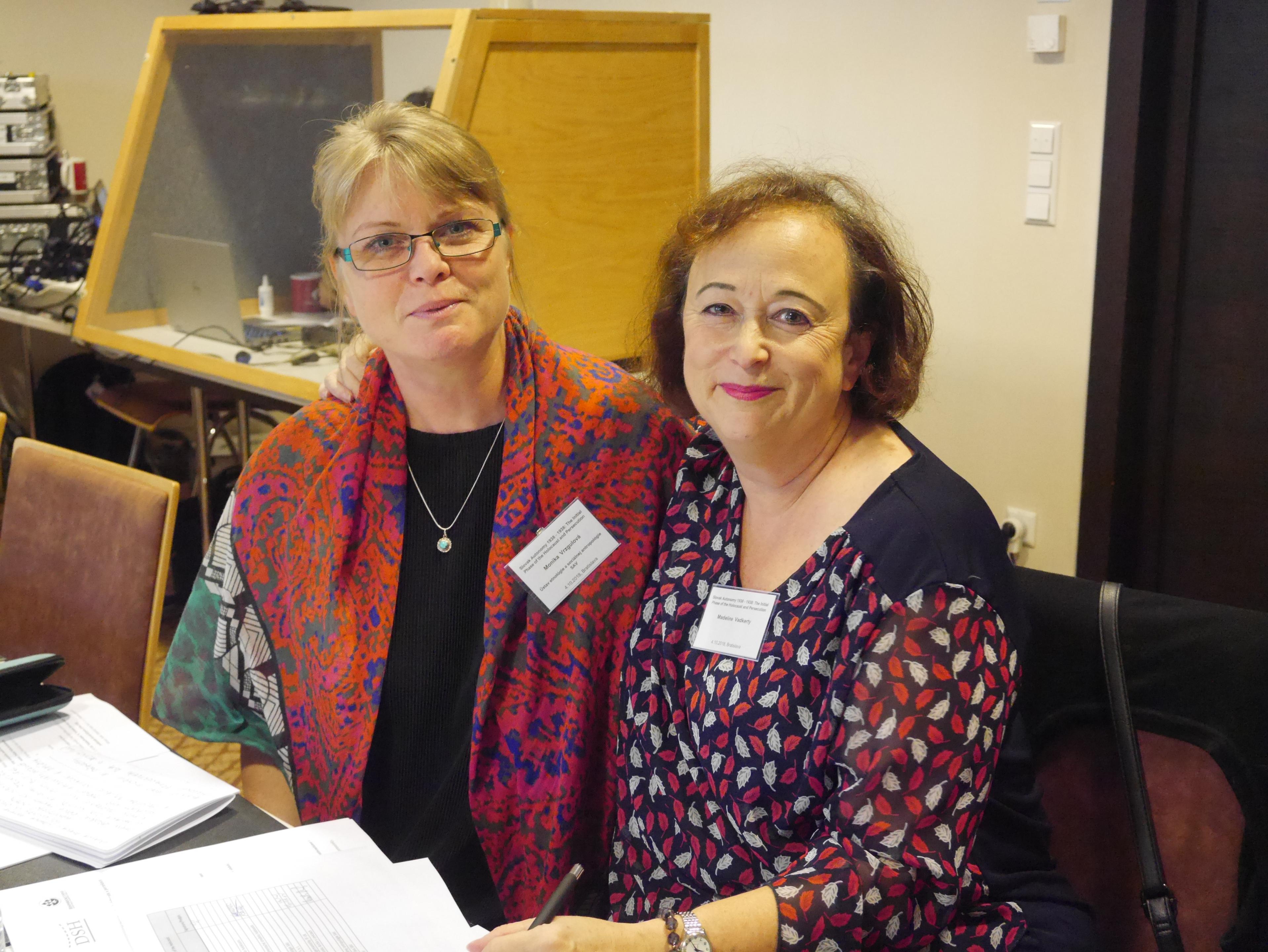Report on EHRI Workshop: Slovak Autonomy 1938 – 1939: The Initial Phase of the Holocaust and Persecution

On 4 October 2018 the Holocaust Documentation Center, in cooperation with the Institute of History of the Slovak Academy of Sciences organized a workshop titled Slovak Autonomy 1938 – 1939: The Initial Phase of the Holocaust and Persecution which was supported by the EHRI framework.
The workshop was thematically dedicated to the 80th anniversary of the declaration of Slovak autonomy on 6 October 1938. This event represented a crucial political milestone after which Hlinkova slovenská ľudová strana (Hlinka Slovak People´s Party, HSĽS) took power over the territory of Slovakia and installed an authoritarian regime. Antisemitism soon became a stable part of its policy. Representatives of HSĽS declared their willingness to deal with the “Jewish question” in a manner similar to Nazi Germany. Newly established paramilitary units of the Hlinka Guard started to attack Jews and so did the press under the control of new regime. The first attempts to establish anti-Jewish legislation and discussions on how to define a Jew took place precisely in this short period of Slovak autonomy. During this time even a special Committee for the “Solution of the Jewish Question” was created.
Moreover, on 4 November 1938 Prime minister Jozef Tiso, the leading representative of HSĽS at that time, ordered the deportations of approximately 7,500 Jews to the Slovak-Hungarian border area, which was to be changed as a result of the First Vienna Award. Some of the Jewish deportees were not accepted on either the Slovak or Hungarian side, so remained in no man´s land, where two refugee camps were built in Miloslavov (Mischdorf) and Veľký Kýr.
 Taking into account the aforementioned activities of the HSĽS regime, this period of Slovak autonomy (6 October 1938 – 14 March 1939) can be considered to be the initial phase of the Holocaust and persecution in Slovakia. It is necessary to remember these events, especially on the occasion of its 80th anniversary, and this inspired the Holocaust Documentation Center to organize a workshop referring to this specific political period in Slovak history.
Taking into account the aforementioned activities of the HSĽS regime, this period of Slovak autonomy (6 October 1938 – 14 March 1939) can be considered to be the initial phase of the Holocaust and persecution in Slovakia. It is necessary to remember these events, especially on the occasion of its 80th anniversary, and this inspired the Holocaust Documentation Center to organize a workshop referring to this specific political period in Slovak history.
The main ambition of the organizers of the workshop was to bring together leading scholars from diverse perspectives who specialise on the topic of Slovak autonomy. The keynote speech was given by Professor Eduard Nižňanský (Department of General History, Faculty of Arts, Comenius University in Bratislava) who is an expert on the Holocaust in Slovakia and the author of pioneering publications dedicated to the deportations which occurred in 1938. Nižňanský´s lecture set the framework for further panels and discussions by contextualizing particular steps which gradually led to the establishment of the HSĽS regime and paid special attention to the dramatically changing status of the Jewish community in Slovakia during this period.
The following paper by Martina Fiamová (Institute of History, Slovak Academy of Sciences) gave an outstanding insight into the formation process of the centralized government in Slovakia under Slovak autonomy. Fiamová also touched on the question of continuity among the state officers and analysed the regime´s intention to fire Czechs and Jews from the civil service.
The Nazi regime of the Third Reich had a demonstrable impact on the gradual dissolution of Czechoslovakia. Attitudes to strengthen these tendencies in Slovakia were being mostly coordinated from Vienna and this becomes particularly clear from the activities of SD (Sicherheitsdienst). This was the topic of discussion in the speech given by Michal Schvarc (Institute of History of the Slovak Academy of Sciences). Schvarc is a leading expert in German-Slovak international relations during WWII as well as on the German minorities living in Slovakia (Volksdeutsche).
The second panel began with an examination of the changes in the legal system during the period of Slovak autonomy. Law historian Katarína Zavacká (Institute of State and Law of the Slovak Academy of Sciences) analysed particular legal tools which culminated in enforcing a new political system in the country. Zavacká pointed out specific legal steps which gradually led to the transformation of the previously established democratic system in Czechoslovakia.
Miloslav Szabó (Institute of History of the Slovak Academy of Sciences/ Department of German, Dutch and Scandinavian Studies, Faculty of Arts, Comenius University in Bratislava) structured his speech around the activities of Catholic pr iest Karol Körper, who was politically active before the establishment of Slovak autonomy. Particular attention was paid to the articles written by Körper and especially to the change of discourse from a focus on “Judeo-Bolshevism” to “solving the Jewish question”.
iest Karol Körper, who was politically active before the establishment of Slovak autonomy. Particular attention was paid to the articles written by Körper and especially to the change of discourse from a focus on “Judeo-Bolshevism” to “solving the Jewish question”.
Michal Frankl´s (Masaryk Institute and Archives of the Czech Academy of Sciences, v. v. i.) presentation was devoted to his current research on refugees in the no man´s land, in particular to the situation in Miloslavov (Mischdorf) – an area located near the Southern Slovak borders where a camp for Jews deported in November 1938, was built. Contextualizing the refugee situation in the late 1930s and analysing the no man´s land as a specific, not only geographic, space has pointed out new perspectives in this research. Moreover, during his speech, Frankl clearly and skilfully presented his work on the EHRI Document Blog by using an interactive map which referred to the no man´s land within the post-Munich Czechoslovak borders.
The third panel began with a lecture on the Jewish response to these political changes – part of the Jewish representatives who decided to establish the Jewish Central Office. Katarína Mešková-Hradská (Institute of History of the Slovak Academy of Sciences) analysed the context of this institution’s establishment, controversies about its acceptance among different Jewish groups as well as its particular activities.
Monika Vrzgulová (Institute of Ethnology and Social Anthropology of the Slovak Academy of Sciences) discussed how the events in Slovakia in the Autumn of 1938 were remembered by Jewish witnesses and recorded in oral history testimonies. Vrzgulová ‘s work is based on selected interviews conducted both by the USC Shoah Foundation Institute for Visual History and the Fortunoff Archive University Yale, and personally by Monika Vrzgulová in the years between 2006 and 2015.
The Nazi intention to dissolve Czechoslovakia was saturated by propaganda. Michala Lônčíková´s (Holocaust Documentation Center/Department of General History, Faculty of Arts, Comenius University in Bratislava) contribution provided information about the organization and content of the Slovak broadcast of the Reich´s Vienna Radio Station. In particular, she paid attention to the phenomenon of antisemitism and analysed the impact of Nazi ideology on the racial perception of Jews as presented in numerous radio speeches.
 The last panel of the workshop was dedicated to the EHRI Project itself. Anna Ullrich´s (Institute of Contemporary History Munich) presentation informed attendees about the main objectives of the project and introduced some of the results and tools created which could be of use for scholars dealing with Holocaust Studies in Slovakia. Wolfgang Schellenbacher (Masaryk Institute and Archives of the Czech Academy of Science, v. v. i.) focused especially on the EHRI Document Blog and Ján Hlavinka (Holocaust Documentation Center/ Institute of History of the Slovak Academy of Sciences) gave a brief insight into the EHRI Portal and emphasized collections regarding the Slovak sources. Even such a specific topic as the deportations of Jews to the no man´s land during the period of Slovak autonomy has been already reflected on in the EHRI Document Blog and Slovak collections relating to this topic have been included within the EHRI Portal.
The last panel of the workshop was dedicated to the EHRI Project itself. Anna Ullrich´s (Institute of Contemporary History Munich) presentation informed attendees about the main objectives of the project and introduced some of the results and tools created which could be of use for scholars dealing with Holocaust Studies in Slovakia. Wolfgang Schellenbacher (Masaryk Institute and Archives of the Czech Academy of Science, v. v. i.) focused especially on the EHRI Document Blog and Ján Hlavinka (Holocaust Documentation Center/ Institute of History of the Slovak Academy of Sciences) gave a brief insight into the EHRI Portal and emphasized collections regarding the Slovak sources. Even such a specific topic as the deportations of Jews to the no man´s land during the period of Slovak autonomy has been already reflected on in the EHRI Document Blog and Slovak collections relating to this topic have been included within the EHRI Portal.
The main intention of the Holocaust Documentation Center was to organize a stimulating workshop where current research on the period of Slovak autonomy, referring to the initial phase of the Holocaust and persecution in this territory, could be presented and discussed. Besides the speakers, other experts from the fields of history, ethnology and archival science were invited to the event in order to lead discussions on an advanced level. Interesting remarks, analytical comments and fruitful discussions after each panel gave proof that this goal was achieved.
The papers presented will be submitted and published in special issue of Forum Historiae, an academic journal of Institute of History of the Slovak Academy of Sciences, in 2019.
Michala Lônčíková
